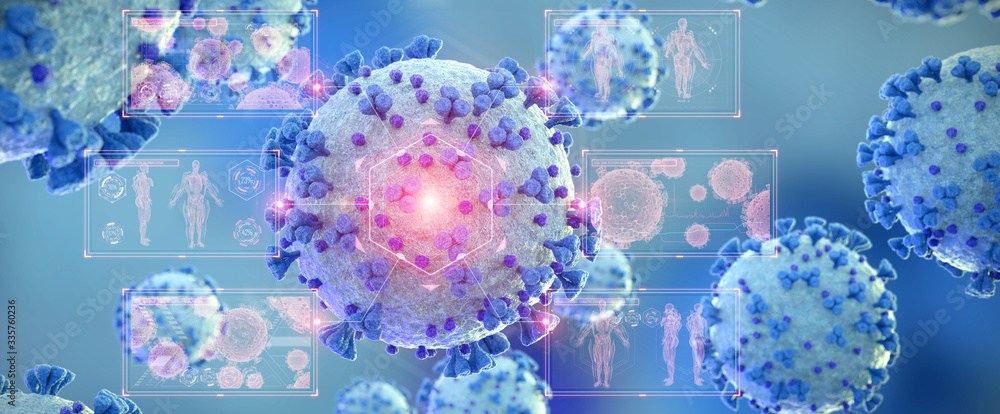What is COVID-19?
Coronavirus (COVID-19 or SARS-CoV-2) is a highly contagious virus affecting the respiratory system and can be quite deadly. Since its origin, it has infected hundreds of millions of people around the world. While the primary mode of transmission is through respiratory droplets, COVID-19 has been found in feces, urine, and semen. With COVID-19 being found in semen, it raises the question of whether this virus could impact male fertility. In addition, it seems that men are at greater risk for more severe symptoms of COVID-19 and have higher mortality rates than women. Therefore, some have hypothesized that androgens (hormones like testosterone that produce male traits) may play a role in COVID-19 viral entry.
What is the relationship between COVID-19 and androgens (testosterone)?
“Testosterone is a co-regulator of expression of both ACE2 and TMPRSS2, which probably aides in the internalization of SARS-CoV-2” (Nassau, D.E. et al., 2022, pg. 3). In one study, it was found that close to 75% of males with COVID-19 had a testosterone deficiency, and lower levels of testosterone had a correlation with increased hospitalization time and disease severity. Because pre-COVID-19 testosterone levels were not measured in these studies, it is unclear if lower testosterone levels are a risk factor for COVID-19 or if COVID-19 leads to lower testosterone levels. Overall, there is not enough information to draw a direct relationship between COVID-19 outcomes and testosterone levels.
How does COVID-19 effect male fertility?
In an evaluation done by Jordan Best and colleagues, a total of 30 men (aged 18 and 70) who had tested positive for COVID-19 were reviewed. They found the median total number of sperm in the ejaculate of men infected with COVID-19 was 12.5 million (i.e. low compared to what would be expected), and sperm concentration was lower than men who were similar ages but did not have COVID-19 (11.5 million/mL vs 21.5 million/mL). The authors also found that the total sperm counts increased up to 18 million 3 months after the infection. In contrast, men who received two doses of the COVID-19 vaccine did not show any differences or reductions in sperm counts compared to those who did not receive vaccines. It is important to recognize that very few studies (with small sample sizes) have been done on this topic, so, it is still unclear how big of an impact COVID-19 infections may have on sperm production in the short and long-term.
Does COVID-19 also affect function of the testis?
The testes are vulnerable to COVID-19, with several reports identifying orchitis (inflammation of the testis) and decreased sperm production when infected. In one study, the authors reported that 18% of men had scrotal discomfort when infected with COVID-19 and 22% had acute orchitis with or without epididymitis. In contrast, men who were vaccinated against COVID-19 were significantly less likely to have orchitis and/or epididymitis and may be protective against developing these symptoms.
Summary and key take home points:
The impact of COVID-19 on male reproductive and sexual function is understudied at this point, with very few studies including small numbers of individuals. Preliminary findings suggest that COVID-19 infection may reduce sperm counts and is associated with lower testosterone levels, although the effect may be temporary. It is important to recognize that many other illnesses have also been shown to temporarily reduce sperm counts and testosterone, so, it is not clear if these findings are any different from other illnesses. Findings do suggest that vaccination likely does not have any negative impact on sperm production and may be protective against future effects of COVID-19 on the genital and reproductive tract.
References
1. Nassau, D.E., Best, J.C., Kresch, E., Gonzalez, D.C., Khodamoradi, K., and Ramasamy, R. (2022). Impact of the SARS-CoV-2 virus on male reproductive health. BJU Int., 129(2), 143-150. DOI: 10.1111/bju.15573
https://pubmed.ncbi.nlm.nih.gov/34402155/
2. Best, J.C., Kuchakulla, M., Khodamoradi, K., Lima, T.F.N., Frech, F.S., Achua, J., Rosete, O., Mora, B., Arora, H., Ibrahim, E., and Ramasamy, R. (2021). Evaluation of SARS-CoV-2 in Human Semen and Effect on Total Sperm Number: A Prospective Observational Study. World J Mens Health, 39(3), 489-495. DOI: 10.5534/wjmh.200192
https://pubmed.ncbi.nlm.nih.gov/33663031/
3. Carto, C., Nackeeran, S., and Ramasamy, R. (2022). COVID-19 vaccination is associated with a decreased risk of orchitis and/or epididymitis in men. Andrologia, 54(2), e14281. DOI: 10.1111/and.14281
https://pubmed.ncbi.nlm.nih.gov/34672002/



